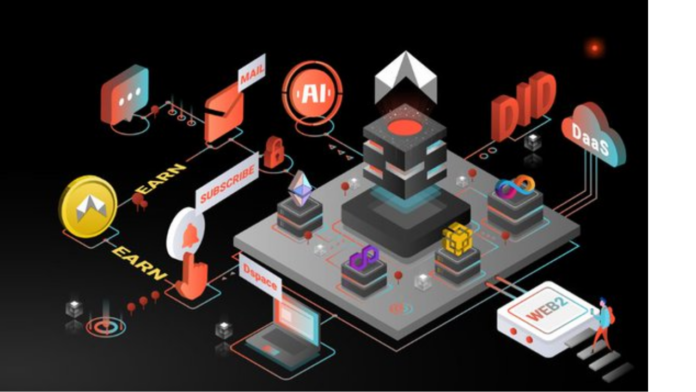Dmail has introduced a new premium encryption feature that transforms the way Web2 emails are handled, ensuring messages remain confidential and decentralised. With the latest update, users can activate premium encryption when sending emails to traditional platforms like Gmail and Outlook. Instead of a direct email containing sensitive content, recipients receive an encrypted string, which can only be decrypted through the Dmail DApp. This innovation guarantees that data stays on decentralised storage, completely secure from exposure.
With digital communication expanding at an unprecedented pace, privacy has become a pressing concern. The challenge lies in bridging the gap between the security-first principles of Web3 and the established infrastructure of Web2. Dmail’s premium encryption provides a solution, offering the familiarity of email while reinforcing security with decentralised technology.
Email remains one of the most widely used forms of communication despite the rise of instant messaging and encrypted chat applications. However, conventional platforms rely on centralised servers, leaving messages vulnerable to breaches, unauthorised access, and surveillance. By integrating end-to-end encryption with decentralised safeguards, Dmail ensures users maintain full control over their data. The sender encrypts the message before transmission, and only the intended recipient can unlock it, eliminating the risks associated with traditional email storage.
Web3 technology has made significant strides in offering alternative communication channels, but adoption remains gradual due to the comfort and familiarity of Web2 tools. Dmail’s latest offering acknowledges this by merging Web3 security with the ease of use associated with conventional email services. Users no longer have to choose between convenience and security—they can enjoy both.
Cybersecurity threats continue to evolve, with phishing attacks, data breaches, and unauthorised surveillance posing ongoing risks. Conventional email platforms, despite their security measures, cannot fully mitigate these dangers. Centralised servers remain attractive targets for hackers, and users often rely on passwords that can be compromised. Dmail’s decentralised encryption method removes this vulnerability by eliminating reliance on any single entity’s server. Messages remain encrypted throughout their journey, inaccessible to anyone other than the intended recipient.
This shift aligns with a broader trend in digital security, where individuals and businesses seek greater control over their information. Data sovereignty has become a focal point, with users demanding solutions that allow them to communicate without intermediaries accessing their private exchanges. Dmail’s approach reflects this demand, ensuring that even when interacting with Web2 platforms, security is never sacrificed.
Beyond individual users, businesses and organisations stand to benefit significantly from this development. Secure communication is a necessity in industries handling sensitive data, such as finance, legal services, and healthcare. Traditional email encryption methods often involve complex configurations and third-party providers, which can be cumbersome. Dmail simplifies the process by offering a seamless encryption mechanism that integrates effortlessly with existing workflows.
User adoption is a crucial factor in the success of any security-driven solution. The more complex a technology appears, the less likely it is to be embraced by the mainstream. Dmail has addressed this by ensuring that the encryption process does not introduce unnecessary hurdles. Sending an encrypted email follows a straightforward process, with the recipient guided through the decryption steps via the Dmail DApp. This ensures that even those unfamiliar with Web3 technology can securely access their messages without technical difficulty.
The introduction of premium encryption also highlights the growing shift towards decentralised applications and their real-world utility. Web3 innovations have often been associated with niche applications or speculative ventures, but practical use cases like encrypted communication demonstrate their broader relevance. Dmail’s move underscores the importance of bridging technological advancements with everyday functionality, making decentralised security more accessible to the wider public.
As privacy concerns grow, regulatory frameworks are evolving to address the challenges posed by digital communication. Governments and organisations worldwide are implementing stricter data protection laws, emphasising the need for solutions that prioritise user control. By ensuring messages remain encrypted and decentralised, Dmail aligns with these regulations while empowering users to manage their security independently.
The success of this initiative will likely influence the direction of future communication technologies. Email encryption is just one aspect of digital security, and as more users demand privacy-focused alternatives, additional innovations are bound to follow. Dmail’s premium encryption sets a precedent for how traditional tools can be enhanced without compromising usability, paving the way for further developments in secure communication.
For users who have long been concerned about the vulnerabilities of conventional email, this update presents a game-changing alternative. Instead of relying on service providers to safeguard their information, individuals can now take control, ensuring that their data remains private. The simplicity of the system, combined with its robust security framework, makes it an attractive choice for anyone looking to enhance their digital privacy.
Dmail’s premium encryption is now available for users who wish to elevate their email security. Whether for personal use or business communication, this feature provides a straightforward yet powerful solution. By seamlessly integrating decentralised encryption into the familiar format of email, Dmail is setting a new standard for privacy in digital communication.


